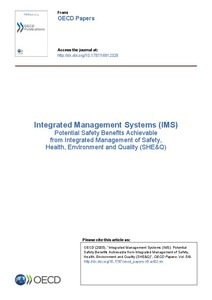Integrated Management Systems (IMS): potential safety benefits achievable from integrated management of safety, health, environment and quality (SHE&Q)
"This report presents the main generic management system standards (i.e. those MS standards used internationally and across business sectors) with special reference to the chemical industry. It also addresses the potential benefits achievable from integrated management of safety, health, enviro...
| Institution: | ETUI-European Trade Union Institute |
|---|---|
| Format: | TEXT |
| Language: | English |
| Published: |
Paris
2005
OECD |
| Subjects: | |
| Online Access: | https://www.labourline.org/KENTIKA-19295802124910130849-integrated-Management-Systems-.htm |
| _version_ | 1771659894331539458 |
|---|---|
| collection | Library items |
| description | "This report presents the main generic management system standards (i.e. those MS standards used internationally and across business sectors) with special reference to the chemical industry. It also addresses the potential benefits achievable from integrated management of safety, health, environment and quality (SHE&Q). The report has been prepared by a consultant, Mr. Ian M. Waldram, Director of the SHEQuality Ltd., Scotland, United Kingdom.The report comes within the framework of the current project on development of guidance for the implementation of integrated management of SHE&Q, in the OECD Programme on Chemical Accidents.
The common elements of all MS models are summarised, and some differences between Quality, Environment and Safety & Health MS are highlighted. The history of the most commonly used MS standards in these three areas is outlined, together with some IMS and Business Risk Management standards. The report then considers a number of practical issues in MS implementation, and illustrates the relevance of these with examples from the interviews.
It is concluded that, whilst appropriate implementation of suitable MS standards can result in continual improvement of OSH results, there are also examples where MS implementation has minimal effect. In particular, if IMS are used in the absence of competent OSH advisors and auditors, OSH results are likely to be variable, even though there is excellent management commitment and employee involvement, as required by the OSHMS standards.
Ten good MS practices are then identified, based on the interviews and other evidence, implementation of which will aid continual improvement of results and ensure MS are efficient in use of resources. One such practice is for chemical sector organisations to use the Responsible Care MS, a sector-specific global standard which incorporates most of the other identified good practices." |
| format | TEXT |
| id | 19295802124910130849_753f2b3810594d25b9c4ecf38ae717c9 |
| institution | ETUI-European Trade Union Institute |
| is_hierarchy_id | 19295802124910130849_753f2b3810594d25b9c4ecf38ae717c9 |
| is_hierarchy_title | Integrated Management Systems (IMS): potential safety benefits achievable from integrated management of safety, health, environment and quality (SHE&Q) |
| language | English |
| physical | 32 p. Paper Digital |
| publishDate | 2005 |
| publisher | Paris OECD |
| spellingShingle | chemical industry chemical safety environmental management integrated approach major accidents hazards occupational safety and health production management safety guide Integrated Management Systems (IMS): potential safety benefits achievable from integrated management of safety, health, environment and quality (SHE&Q) |
| thumbnail | https://www.labourline.org/Image_prev.jpg?Archive=118040293622 |
| title | Integrated Management Systems (IMS): potential safety benefits achievable from integrated management of safety, health, environment and quality (SHE&Q) |
| topic | chemical industry chemical safety environmental management integrated approach major accidents hazards occupational safety and health production management safety guide |
| url | https://www.labourline.org/KENTIKA-19295802124910130849-integrated-Management-Systems-.htm |

